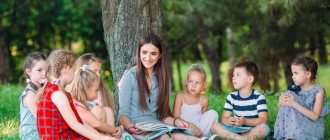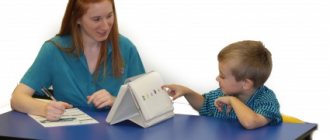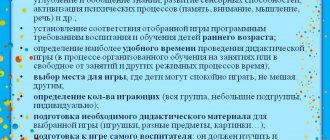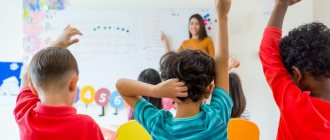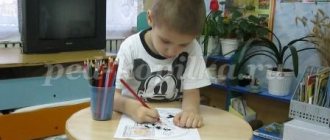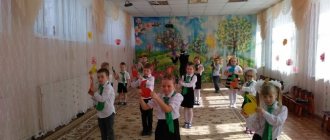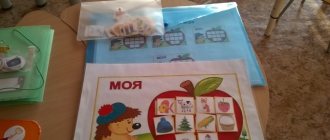Methodological recommendations for speech development of preschool children
Methodological recommendations on the speech development of preschool children in the conditions of the Federal State Educational Standard
The approval and implementation of the Federal State Educational Standard for Preschool Education entails the need to find new approaches to planning and organizing speech work with children.
The organization of work and the main methods of speech development for preschool children are determined by the educational program.
The organization of children's speech development in a preschool educational institution in modern conditions involves the search for effective methods and techniques for the development of children's speech.
It is necessary to organize two centers that stimulate children's speech activity. This is a literary center (book corner) and a speech development center (speech corner).
Literary works selected for the book corner should be varied in genre, theme and content.
Literary Center
| Age group | Book corner equipment |
| Second early age group | There should be a few books in the book corner - 4-5, but the teacher should have additional copies of the same books in stock: 1) books on a dense basis based on familiar fairy tales, nursery rhymes, no more than 5 sheets in volume; 2) books with dynamic elements (moving eyes, opening and closing windows, etc.); 3) books of different formats: half-books (half a landscape page), quarter books, little books; |
| Junior group | There should be 4–5 book titles in the corner: 1) books with hard sheets, as in 1st junior; 2) books with a regular leaf structure; 3) prints on themes of Russian folk tales. 4) plot pictures based on fairy tales and program works. |
| Average group | In the book corner it is necessary to place familiar fairy tales, stories about nature, animals, etc. (4-6 books, the rest are in the closet): 1) books with the same work, but illustrated by different artists; 2) albums are supplemented by themes: “Russian Army”, “Adult Labor”, “Flowers”, “Seasons”; 3) postcards for viewing works; 4) portraits of writers: S. Marshak, V. Mayakovsky, A. Pushkin; 5) thematic exhibitions “Fairy Tales”, “Seasons”, “Tales of Animal Friendship”, etc. (once a quarter); 6) material for repairing books |
| Older group | 1) 10-12 books of various topics and genres (maybe books of the same title, but illustrated by different artists); 2) portraits of writers: M. Gorky, S. Mikhalkov, B. Zhitkov, L. Tolstoy, N. Nosov, K. Chukovsky; 3) books recommended by the program; |
| Preparatory group | In the book corner of preparatory groups there should be a library of little books. It is necessary to prepare attributes for the role-playing game “Library” (forms for each child, index cards for each book, etc.) |
Speech center
| Age group | Fullness of the speech corner |
| Jr preschool age | 1. Sets of pictures and postcards on main lexical topics and for grouping, up to 4-6 in each group: domestic animals, wild animals, animals with cubs, birds, fish, trees, flowers, vegetables, fruits, food, clothing, dishes , furniture, transport, household items, etc. 2. sets of subject pictures for sequential grouping according to various characteristics (purpose, etc.). 3 Series of 3-4 pictures to establish the sequence of events (fairy tales, social situations). 4. . Series of 4 pictures: parts of the day (activities of people in the immediate environment). 5. Series of 4 pictures: seasons (nature and seasonal activities of people). 6. Large format narrative pictures (with various themes close to the child - fairy tales, social everyday life) 7. Lotto of various types (“Pets and birds”, “Wild animals”, etc.). 8. Toys (didactic, figurative, sets of toys). 9. Aids and games for the formation of correct speech breathing: “Leaflets”; "Butterflies"; "Magic fluff"; multi-colored balls; sultans; paper snowflakes, etc. 10. Aids and games for the formation of phonemic perception and hearing: noise instruments; sound boxes; rattles; subject, plot pictures to activate and automate sounds. 11.Development of fine motor skills: massage balls, clothespins, stencils; finger games; mosaics; lacing games and other encyclopedias (“smart” books), dictionaries; |
| Middle preschool age | 1. Sets of pictures on lexical topics and for grouping and generalization (up to 8-10 in each group): animals, birds, fish, insects, plants, food, clothing, furniture, buildings, transport, professions, household items, etc. 2. Sets of paired “lotto” type pictures of 6-8 parts. 3. Sets of paired pictures for correlation (comparison): find differences (in appearance), errors (in meaning). 4. Sets of tablets and cards for comparison by 1-2 characteristics (logical tables). 5. Sets of subject pictures for grouping according to different characteristics (2-3) sequentially or simultaneously (purpose, color, size). 6. A series of pictures (4-6 each) to establish the sequence of events (fairy tales, social situations, literary plots). 7. Series of pictures “Seasons” (seasonal phenomena and human activities). 8. Scene pictures with different themes, large and small format. 9. Cut (folding) cubes with plot pictures (6-8 parts). 10. Cut-out plot pictures (6-8 parts). 11. Cut contour pictures (4-6 parts). 12. Set of cubes with letters. 13. A set of cards with an image of an item and its name. 14. Toys (didactic, figurative, sets of toys). 15. Results of children’s creative activity: albums of children’s riddles, books of children’s fairy tales, portraits of literary heroes, etc., made by children in the process of project activities 16. Aids and games to reinforce correct speech breathing: “Leaflets”; "Butterflies"; "Magic fluff"; multi-colored balls; sultans; paper snowflakes; pinwheels - pencils; foil bells on a string, etc. 17. Aids and games for the formation of phonemic perception and hearing: noise instruments; sound boxes; subject, plot pictures to activate and automate sounds. 18. Aids for the development of fine motor skills: massage balls, clothespins, stencils; finger games; mosaics; lacing games, etc. |
| Senior Preschool age | 1. Aids for cultivating proper physiological breathing (simulators, “Soap Bubbles”, inflatable toys, “Leaves”; “Butterflies”, etc.). 2. Aids and games for the formation of phonemic perception and hearing: noise instruments; sound boxes; subject, plot pictures to automate sounds and theirs; games with paired cards (sounds: R, L; S, 3, C; Sh, Zh, Shch); 3. Games for improving language analysis skills (“Syllabic lotto”, “Locate the place of the sound”, “Choose words”, “Chain of sounds”, etc.). 4. Games to improve the grammatical structure of speech. 5. Clarification, enrichment and activation of vocabulary. 6. Availability of manuals and demonstration materials for preparing children to learn to read and write. 7. Results of children’s creative activity: albums of children’s riddles, books of children’s fairy tales, portraits of literary heroes, etc., made by children in the process of project activities 8. Aids and games to reinforce correct speech breathing: “Leaflets”; "Butterflies"; "Magic fluff"; labyrinths; multi-colored balls; sultans; paper snowflakes; pinwheels - pencils; foil bells on a string; “Whose boat will get there faster”; “Put the ball into the goal”, etc. 9.Development of fine motor skills: massage balls, clothespins, stencils; finger games; mosaics; lacing games, etc. 10. Audio recording with sound effects. 11. Computer programs for speech development and literacy training for preschool children, etc. |
In my opinion, short instructions for teachers will be good assistants, especially for young professionals.
Memo1
Requirements for a children's story
- the story must be reliable (the child must not distort facts and phenomena);
- the story must be presented by the child independently (you should not interrupt the child, it is better to evaluate its content together later);
- during the story, the child should not deviate from the topic;
— a preschooler must be able to establish cause-and-effect relationships;
- the sentences should be common (if the child uses simple constructions, after the story you can ask clarifying questions and ask to repeat the sentences);
— the story should be quite expressive. To do this, before composing the story, at the stage of analyzing the illustrations, you can ask to find expressive, precise words that convey the behavior of the characters. The child repeats the sentence with this word, and then proceeds to compose a story.
- culture of storytelling (you don’t need to walk while telling a story, you shouldn’t suddenly change your position or get distracted; try to look at the listener, don’t say the words “well,” “here,” “so”)
Methodological advice when preparing for storytelling.
1. In order to create a coherent story, three problems must be solved.
1.1- the child must understand what needs to be talked about. The teacher explains in detail what needs to be talked about. When working with older preschoolers, the teacher himself should not explain the topic in detail. Instead, we tell the topic and discuss with the children what needs to be talked about. In the process, prevent errors that will interfere with the disclosure of the topic.
1.2- you need to make a plan for the story. To do this, use questions to think about what the child will talk about first, how he will continue the story, and how to end the story.
1.3- pay attention to the selection of language material (use of synonyms, selection of words for more expressive speech structures).
2. The teacher’s speech sample plays an important role (reveals the topic expressively, consistently, coherently).
Memo 2
Methodological techniques for leading a conversation
Do not let children move away from the main topic.
Steadily lead to final conclusions.
Do not interrupt children unless absolutely necessary. Refer comments and amendments to the end.
Don't require complete answers. The conversation should be conducted naturally and at ease. A short answer, since it is logical and grammatically correct, can be more convincing than a common one.
Don't overuse questions. Do without them, if it is possible to achieve the same goal through brief instructions and reminders.
Encourage children to ask questions.
Involve all children in evaluating the thoughts expressed and their verbal presentation.
Encourage competition in the desire to speak clearly and elegantly. These recommendations can be applied to conducting a conversation on any topic.
Memo 3
Method of memorizing a poem.
When memorizing a poem with children, the teacher sets himself several tasks at once:
- to arouse interest in the poem and a desire to know it;
-help to understand the content;
- ensure memorization;
- teach to read expressively;
- to cultivate a love of poetry.
Construction of a lesson on memorizing a poem
has much in common with the structure of retelling activities.
At the beginning of the lesson, it is advisable to conduct a short introductory conversation. The teacher turns to the figurative, emotional memory of the children. You can show a toy, a picture that is close to the theme of the poem.
Expressive reading by the teacher of a poem, re-reading it.
In older groups, before re-reading, children are warned that the poem will need to be memorized, and they conduct a little explanatory work, a conversation about the poem itself, about the form of its reading.
After the conversation, the teacher’s reading is heard again.
Children reading a poem. The entire poem is memorized. Repeating the poem individually, not in chorus.
At the beginning of the lesson, the poem is repeated by children who remember quickly. The teacher prompts the text along the way.
You can end the lesson on memorizing a poem with the most striking performance.
Memo 4
Game aids in the speech development of children.
Lull rings are one of the means for developing the intellectual and creative abilities of children, proposed by the authors of TRIZ and RTV for use in preschool institutions.
Lull rings
solves the following problems:
acquaintance with the surrounding world,
development of the phonetic-phonemic aspect and lexical-grammatical structure of speech,
development of higher mental functions and intellectual development of the child.
Lull rings allow children to develop mobility of thinking, variability of answers within a given topic, they introduce an element of play into the lesson, and help maintain interest in the material being studied.
"Find the Cub"
Target :
formation of knowledge about animals
and their young
“One is many”
Target :
consolidation and distinction
concepts "one - many"
"Who eats what"
Target:
consolidation of knowledge about animals and their nutritional needs
«Kids toys»
Target:
consolidation of knowledge about toys, the ability to separate them by gender
Memo 5
Using a fairy tale plot in the classroom
Teachers often use fairy-tale plots in class. A fairy tale plot is presented as a sequence of certain events.
Detection of a shortage of some item (violation of a prohibition, as a result of which a character disappeared or was kidnapped), an unfulfilled desire; sending (or independently leaving) the hero for the missing object.
2.Meeting of the hero with the donor of the magic remedy; preliminary test of the hero (for strength, dexterity, kindness, ingenuity, etc.
3. The hero receives a magical remedy from the donor; using it to overcome obstacles on the way to the missing object.
4.Meeting of the hero with the owner of the missing object; the main test of the hero.
5. The hero’s victory and his receipt of the desired object.
6. The return of the hero and his receipt of a reward.
If you substitute specific characters into this diagram and describe their specific actions, you will get a new fairy tale invented by you.
Memo 6
The role of breathing exercises in speech development classes.
Proper breathing is very important for speech development. Breathing affects sound pronunciation, articulation and voice development.
Proper breathing will help your child learn to speak calmly, smoothly, and slowly. Some breathing exercises also help teach the child how to pronounce certain sounds correctly.
Pronouncing most sounds of the Russian language requires a strong, directed air stream, the development of which is carried out simultaneously with articulatory gymnastics.
Do not forget!
The child should not take convulsive, sharp breaths with raised shoulders and tension. The inhalation should be calm. In addition, breathing exercises tire the child, so you should not do them for a long time, a few minutes is enough, because Prolonged blowing and prolonged fixed exhalation can cause dizziness.
"Footballers"
Alternately, an adult and a child blow on a cotton ball (“soccer ball”), trying to score a goal into the goal (“pencils”). Make sure that you inhale through your nose and exhale smoothly and forcefully, using your lips as a tube.
"Ships"
Invite your child to blow on paper boats floating in a basin of water, sometimes smoothly, sometimes faster, and follow the movement of the boats.
"Focus"
Smile, open your mouth slightly, place the wide front edge of your tongue on your upper lip so that its side edges are pressed together and there is a groove in the middle of your tongue, and blow off the cotton wool placed on the tip of your nose. The air should go in the middle of the tongue, then the fleece will fly up.
Memo 7
The role of play aids in the development of fine motor skills.
Finger and sign games are invaluable in speech development. Simple and exciting, they promote the development of fine motor skills in a playful way, stimulate visual and auditory perception, attention, memory, coherent speech, and enrich vocabulary.
I offer you the simplest exercises that can be done aimed at developing fine motor skills in your children’s hands.
Games with pasta
Playing with pasta develops fine motor skills, visual perception, creativity and a sense of composition.
Games with lids
Target:
Select the color of the lid and post a picture.
Figures made from clothespins
There are clothespins in the group. Children make various figures out of them. The game is accompanied by poems and riddles, thereby developing the child’s auditory perception. These exercises can be used in mathematics, design classes, as well as in your free time. When performing exercises, the child develops fine motor skills, counts clothespins, and comes up with shapes himself, thereby developing his imagination.
Games with chestnuts and walnuts.
I use chestnuts and walnuts for rolling with my palm on a table or other surface, as well as between my palms.
This activity is an additional massage of the palms and improves hand coordination. In addition to rolling movements, I use nuts to transfer and hold them between my fingers. This training perfectly develops finger mobility and improves fine motor skills.
SYSTEM OF METHODOLOGICAL WORK IN PRESIDENTIAL EDUCATIONAL INSTITUTIONS
MODEL OF METHODOLOGICAL WORK IN A PRESIDENTIAL INDUSTRY
LIST OF PUBLICATIONS OF TEACHERS FROM 2013 – 2020
AUTHOR'S TARGETED PROGRAMS FOR PRESENTER EDUCATION TEACHERS
SITES OF PRESENTER EDUCATION TEACHERS
Pedagogical Council No. 1 “Planning the academic year”
The purpose of this event was to approve the annual work plan of teachers for the new academic year. The work of creative groups, work on additional education, physical education and recreational work and other documents were also approved. An educational psychologist also worked with the team, who set teachers up for positive emotions in the new school year.
Workshop “Children’s psychological health is...”
Irina Vladimirovna Stryapikhina, a teacher-psychologist at a preschool educational institution, prepared a workshop on the problem of the psychological health of our students. More and more attention has been paid to the child’s psychological health and state of mind. It becomes clear that children experience difficulties in relationships with parents and teachers, difficulties in learning, stress and depression. But how psychologically healthy a child is in childhood will determine how healthy the adult personality will be.
Pedagogical Council “Summing up the 2020-2021 academic year”
The purpose of this event was to summarize the activities of the preschool institution and the results of the work of employees over the past year. Combining the efforts of the preschool educational institution team to improve the level of the educational process. The pedagogical council was held on the topic “Sea Voyage”. Teachers recalled memorable events this school year and shared their successes and difficulties. The results of the implementation of annual tasks, participation in competitions at various levels and implementation of the educational program were summed up.
City online webinar “Teacher interaction with children with special educational needs. Aggressive children"
In accordance with the work plan of the city professional community of educators and pedagogical psychologists of the MDOU for the 2020/2021 academic year, on May 12, 2021, an online webinar “Interaction of a teacher with children with special educational needs” was organized. Aggressive children" The webinar participants spoke about the characteristics of such children, and an individual approach to them, as well as about the successful socialization of such children in preschool educational institutions"
Pedagogical council “Early career guidance for preschool children, as one of the secrets of their successful personal self-determination in the future” The purpose of this event was to increase the level of theoretical and practical training of educators, improve the practical skills necessary in familiarizing preschool children with the professions of adults.
Teachers presented their developments on didactic games, laptops, and the organization of RPPS for role-playing games. All this contributes to the development of their professional skills in early career guidance for preschool children.
School for young teachers “Online Meetings”
As part of organizing work with young specialists from the MDOU, an online meeting of the School of Young Teachers was held on October 28, 2022. At the event, issues related to the gradual entry of a child into kindergartens and his adaptation were discussed.
Pedagogical Council “Flight to the 2022 academic year”
The installation pedagogical council was held at the beginning of the 2020-2021 academic year. It was themed on an airplane flight. We summed up the results of the work for the last academic year, identified new annual tasks and, in conclusion, congratulated the winners of the competition “Plot of the 21st Century”. Work plan: • Summing up the results for the 2019-2020 academic year • Introduction to the annual tasks for the 2020-2021 academic year • Work of creative groups for the 2020-2021 academic year • Work of the School for Young Teachers. • Self-education of teachers. • Awarding the winners of the “21st Century Section”
Business meetings “Self-education of teachers - the path to increasing the professional competence of teachers”
Business meetings were held as part of the work of teachers on self-education for the 2019-2020 academic year. Each teacher worked on his own topic, which was of interest to him professionally. The teachers surprised us with their methodological developments and manuals that they developed for children.
From creative teacher to creative student
This year our kindergarten teachers took part in the IX Regional Scientific and Practical Conference of Young Professionals – Preschool Teachers “From a Creative Teacher to a Creative Pupil”, which was held as part of the implementation of the national project “Education”. Kolubat E.A., Chindyaskina I.A., Yakovleva E.A., Pavlova D.A. and Kalashnikov S.V. published their articles with experience in the collection of materials of this conference.
Open lesson with speech therapist N.V. Stovba on literacy
As part of the implementation of the literacy program, an open lesson was held with the teacher - speech therapist N.V. Stovba. on teaching literacy to preschool children for teachers of senior and preparatory groups.
Organization of work with students
Our kindergarten cooperates with Pedagogical College No. 1 and the Pedagogical College at SUSPPU on organizing internships for students. This time, students got acquainted with the organization of the developing subject-spatial environment in a preschool educational institution.
Events with teachers
Open classes by Moiseeva O.B., a teacher of the highest qualification category in FEMP in the preparatory group within the framework of the School of Young Teachers.
Opening of a city school for a young teacher
The grand opening of the academic year at the “School of Young Deputy Heads and Senior Teachers of the MDOU” and the “School of Young Teachers of the MDOU” took place on October 9 in the assembly hall of the MBU DPO “Center for Educational Development of the City of Chelyabinsk”. The event was held as part of the organization of work with young specialists from preschool educational institutions in Chelyabinsk in accordance with the regulations for the Unified City Methodological Day.
The grand opening was attended by more than 150 young professionals who came to work in preschool educational institutions in the 2017-2019 academic year.
Open classes by Zheleznova A.P., a teacher of the highest qualification category within the framework of the School of Young Teachers.
Seminar about self-education
Purpose of the seminar: Improving the independent work skills of teachers in self-education. Objectives: To reveal the essence of the process of self-education, the urgent need for self-education in modern conditions. To motivate teachers for professional self-development and self-improvement through conscious independent cognitive activity. Promote self-determination by teachers of personal development trajectory and self-improvement. Involve teachers in collective activities, develop the ability and desire to interact with each other to solve non-standard situations. Create favorable conditions for communication and interaction between teachers.
Young teacher school
In the 2022 academic year, the School of Young Teachers was organized for educators whose work experience is less than 3 years. As part of the School’s work plan, the first lesson “Regulatory documents regulating the activities of preschool educational institutions” was held.
Instructional pedagogical council for the 2022 – 2022 academic year
Teachers' Council Plan • Summarize the results of summer health work. • Approve the annual plan, teacher certification schedule for the 2019/20 academic year, and the work plan of the creative group for early career guidance. • Familiarize yourself with the annual tasks of the preschool educational institution. • Work on self-education of teachers. • Organization of a school for young teachers. • Summarize the results of the review-competition “Plot of the 21st Century”. • Congratulations “Work song”, “Digital wind”, “Blooming city” • Make a decision of the teachers' council.
Seminar-workshop “Early career guidance of children in preschool educational institutions”
As part of continuity in career guidance, kindergarten is the initial link in a single continuous education system. It is in kindergarten that children become acquainted with the diversity and wide choice of professions. At this stage, it is necessary to create a certain visual basis, an environment on which the further development of professional self-awareness will subsequently be based.
Final teaching advice
The end of May is the time to sum up the results of the 2022 – 2019 academic year. The pedagogical council held on May 30 was held according to the following plan:
1. Results of the implementation of the annual plan for the 2018-2019 academic year.
2. Results of monitoring children’s learning of PEP
3. Recommendations for conducting pedagogical activities with children. (results of the lessons watched)
4. Analysis of held events and competitions.
5. Analysis of scheduling.
6. Analysis of the work of teachers during the school year.
7. Approval of the summer work plan.
Screening of the open pedagogical event “Flight to the planet Gramoteika”
The purpose of this event: to increase the level of professional competence in organizing pedagogical events in the form of interactive interaction with children using problem-based learning technology.
Screening of the open pedagogical event “Journey to the Land of Health”
The purpose of this event: Learn to draw up the tasks of the NNOD and implement them during its implementation. Strengthen the ability to build self-analysis of the event.
The formulation of educational objectives must meet the stages of development of mental processes, speech skills, age-related program objectives, modern requirements of the Federal State Educational Standard for Educational Education for the implementation of objectives in educational areas
Memo for the teacher when setting NNOD tasks
Memo for the teacher
Seminar-workshop “Theatrical activities in kindergarten”
Theatrical activities in kindergarten are of great importance for the development of children. They allow preschoolers to build interaction and communication with each other, taking into account age capabilities and individual characteristics. We discussed with the teachers how to properly organize theatrical activities in kindergarten.
Showing NNOD
In order to solve the annual task of increasing the level of professional competence of teachers through the introduction of problem-based learning technology into educational activities, open classes were organized in the kindergarten.
Seminar workshop “Formation of interethnic tolerance in preschool children in the context of multicultural education”
Seminar plan: 1. The problem of developing interethnic tolerance among preschool children in preschool educational institutions. 2. Basics of the formation of interethnic tolerance in preschool children in preschool educational institutions. 3. Conditions for the formation of interethnic tolerance in multicultural education.
Competition "Best educational development environment for a group in a preschool educational institution"
The purpose of the competition is to create conditions in preschool educational institutions that promote the development of preschool children. Objectives of the competition: - creation of conditions in preschool educational institutions for the development of children in accordance with the requirements of the Federal State Educational Standard for Educational Education, and with the requirements for a developing subject-spatial environment, in particular; — stimulation of innovative activities of teachers in organizing the subject space of groups; — study and generalization of the best pedagogical experience of working in preschool educational institutions in creating a subject-development environment for preschool children in accordance with the implemented program; — ensuring the emotional well-being of children, developing a positive sense of self and competence, including them in a variety of specifically preschool activities.
Seminar workshop “Technology of problem-based learning”
Problem-based learning in kindergarten is an organization of interaction with students that involves the creation, under the guidance of a teacher, of problematic issues, tasks, situations and the active independent activity of children to resolve them. With problem-based learning, the teacher’s activity changes radically: he does not present children with knowledge and truth in a ready-made form, but teaches them to see and solve new problems and discover new knowledge. Seminar plan: 1. The essence of problem-based learning 2. Basic concepts: problematic, problem, problematic situation, educational problem, problematic task. 3. Differences between communicated learning and problem-based learning. 4. Stages of problem-based learning. 5. Methods of problem-based learning. 6. Posing questions in the process of problem-based learning.
Pedagogical Council “Annual tasks for the 2018-2019 academic year”
Agenda of the pedagogical council No. 1: 1. Familiarization with the order to hold the pedagogical council. 2. Analysis of the readiness of kindergarten groups and premises for the beginning of the school year. 3. Analysis of the institution’s work during the summer health period. 4. Personnel changes in MBDOU for the 2018-2019 academic year. 5. Approval of the work plan for the 2018-2019 academic year. 6. Approval of the GCD schedule and cyclograms of specialists’ activities, etc.
Pedagogical Council "Flower Extravaganza"
Agenda of the pedagogical council No. 4: 1. Results of the implementation of the annual plan for the 2017-2018 academic year 2. Analysis of the activities carried out in the preschool educational institution. 2. Results of monitoring children’s mastery of PEP 3. Analysis of open demonstrations of pedagogical activities with children 5. Approval of a plan for working with children for the summer health period.
Organization of work with students. Working with preschool students.
GOAL: To develop in students pedagogical skills and professionally significant personality traits of a teacher. Objectives: - To develop the ability to design the educational process in accordance with the program implemented in the preschool educational institution, the level of development of children and the integration of educational areas. — Contribute to the formation of the ability to motivate and organize children for different types of activities in accordance with their needs and capabilities. Develop the ability to establish constructive interaction with parents using a variety of forms. — To develop the ability to reflect on one’s own teaching activities based on an analysis of the results of children’s activities.
Holding open events
One of the important forms of organizing methodological work is open classes. An open lesson, unlike a regular one, is a specially prepared form of organizing methodological work; at the same time, a real educational process takes place in such a lesson. Non-standard, non-traditional activities are of particular importance. In an open lesson, the teacher shows and demonstrates to colleagues his positive or innovative experience, the implementation of a methodological idea, the use of a methodological technique, a teaching method. An open lesson has a methodological goal, which reflects what the teacher wants to show to those attending. (Photo from the folder Open classes)
Workshop “Organization of children’s activities using the game aid Froebel’s Gifts”
F. Froebel developed his own didactic material (i.e., “educational” material) for preschool children - the world’s first didactic material for preschoolers. It was called "Froebel's gifts." Froebel's gifts included objects of different shapes, sizes and colors: balls, a cube, balls, a cylinder, sticks for laying out, strips for weaving, etc. The Froebel system has received recognition in many countries of the world, including Russia. Froebel courses and Froebel societies were created. But when used in kindergartens, games with Froebel's gifts became formal, not at all joyful exercises for children, in which the child was only an observer of the actions of adults. And the original idea of children's activity in the game was violated. It was for this that Froebel was criticized a lot in the future, noting the excessive dryness of his games, the lack of life in them, and the excessive regulation of children’s actions. And his teachers in Russia were called “little maids.” Therefore, the Froebel system is not fully applied now. But many of Froebel’s findings and ideas are still used, modified and modified in accordance with modern data on the development of preschool children. And even to this day a complete set of materials for games with Froebel’s gifts is being produced for games with children in kindergartens
Competition "Duty Corner"
The main goals and objectives of the competition are: • creating conditions for the development of labor skills while children are on duty; • enrichment of the subject-developmental environment in the group; • identifying the initiative and creative approach of teachers and junior educators to creating conditions for children's duty.
Master class by art teacher (T.S. Landeis) “Palm Theater”
A theatrical game is a creative game in which a literary work is acted out in faces using expressive means such as intonation, facial expressions, gestures, posture, gait, that is, specific images are recreated. Modern pedagogy pays more and more attention to the emotional sphere of the child’s personality. Theatrical activities introduce children to the world of beauty, develop imagination, memory, communication, and reveal their creative potential. All this contributes to the harmonization of the child’s relationship with the outside world. “Theater on the Palm” solves this pressing problem of developing cognitive interest and a creative attitude towards the world. The use of innovative pedagogical technologies opens up new opportunities for the education and training of preschool children.
Competition “The best website for a preschool teacher”
The competition is held with the aim of creating a unified educational information space for preschool educational institutions, intensifying the activities of teachers in mastering modern information technologies, and increasing the role of informatization in improving the educational process. The main objective of the competition is to identify the best experience of teachers in creating and operating educational websites and disseminating their work experience. (Photo from the folder “Award Site”)
Competition "Best Portfolio of a Preschool Teacher"
Goals and objectives of the competition:
1. Motivating teachers for professional development and increasing professional competence, summarizing and identifying the results of their teaching activities, disseminating and generalizing teaching experience. 2. Identifying support and encouragement for creatively working teachers and creating conditions for their self-realization. Dissemination of best practices of teachers. 3. Encouraging teachers to create, use and promote their own resources, including on the Internet. Improving the ability to work using computer technology. 4. Creation and filling of an electronic database of teachers’ portfolios on the Internet site of the preschool educational institution.
AdmirorGallery 4.5.0, author/s Vasiljevski & Kekeljevic.
Senior group. Senior preschool age. Children 5-6 years old
Long-term planning for self-education in the senior group “Environmental education of preschool children” Long-term planning for self-education in the senior group on the topic: “Environmental education of preschool children ”
.
Educator : Nozdryukhina Yu.V. I. Target section. 1. Explanatory note. Environmental education is a new direction of preschool pedagogy , which differs from...
Game workshop for educators from the experience of teaching literacy to older preschoolers “Games with sounds and letters” GAME PRACTICUM. “GAMES WITH SOUNDS AND LETTERS”
for
educators from experience in teaching literacy to older preschoolers PRESENTER: - Good afternoon, dear educators ! Today we will play together. Let's learn about letters and sounds together today! Games with sounds and letters are the main...
Junior group. Early childhood, nursery. Children 1-4 years old
Quiz game for teachers “The influence of oral folk art on the development of speech of young children” MUNICIPAL BUDGET PRESCHOOL EDUCATIONAL INSTITUTION “KINDERGARTEN No. 22 “CRANE”
GENERAL DEVELOPMENTAL KIND OF PRIORITY IMPLEMENTATION OF ACTIVITIES IN THE ARTISTIC AND AESTHETIC DIRECTION OF CHILDREN’S DEVELOPMENT Quiz game for
teachers “The influence of oral folk art on...
Self-education program “Moral and patriotic education of young children through love for family” Self-education program “Moral and patriotic education of young children through love for family”, early childhood teacher Kolpakova 2021-2022 Goal: creating the prerequisites for the moral and patriotic education of young children through...

